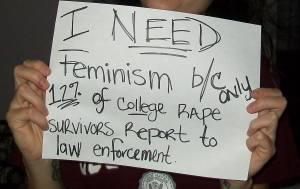A lot of times, people do not put faces to crimes and statistics they hear about. A great example is when people hear the term Clery Act, which requires all colleges and universities that participate in federal financial aid programs to publicly disclose statistics about on-campus crimes. Were you under the assumption that this Act was just randomly named? Here’s the herstory.
Jeanne Clery was a freshman at Lehigh University of Pennsylvania, and only five days after being in her freshman dorm, she was raped, sodomized, beaten, bitten, strangled with a metal coil and mutilated with a broken bottle. All of this happened in her dorm room. Clery’s killer was Josoph M. Henry, who was 20 at the time. He lived off campus, but was able to gain access to the dorm by doors that were propped open with empty pizza boxes. Henry then allegedly bragged to his friends about being able to get into the building to completely violate and murder someone.
She is the face of the Clery Act. A freshman who had so many hopes, dreams, and so much potential.
Granted, this happened in 1990, and the safety on campuses has been upped a bit since then, but I still don’t believe campuses are completely safe. Working at the HOPE Center (a women’s resource center) on my campus only backed up my beliefs on this. How safe do people really feel on campus?
With so many freshmen starting college soon (at least, here in Pennsylvania), I can only help but think of Jeanne Clery and hope that all college campuses are just a bit safer.
There are a lot of tips for what people can do to get involved on campus to try to deFACE sexual assaults:
1. Share resources and groups that help survivors.
The first step in helping survivors heal is to believe them. Research shows that only 2% of survivors disclose their sexual assault to the police.
Once a survivor confides in you, connect her or him with national, community, or campus resources, like a counseling center, advocacy office, the police, or a public safety group. Remember your role is to help; if the survivor doesn’t want to seek outside assistance, don’t insist. You cannot force someone to seek help, regardless of the situation. But please just be a friend and listen; you don’t know how helpful that alone just is.
2. Write an op-ed.
Op-ed pieces can inform and influence readers and can bring considerable attention to this cause. Research campus sexual assault, and then write an op-ed for a school, local, or national newspaper or even a blog. (Smiles)
3. Use social media.
Social media tools can help spread awareness and advocate for social change. Use hashtags to start or join in conversations on Twitter, Tumblr, or Instagram. (For example, use #SAAM, which stands for Sexual Assault Awareness Month, during the month of April.) On Facebook, post articles and share events to get your friends in the know.
4. Start a conversation on victim-blaming and how to stop it.
Any time you hear anyone making jokes about sexual assaults, tell them to stop. And also explain why they should stop. A lot of people surprisingly are not educated on topics like this.
5. Get involved in national campaigns.
•The Clothesline Project— Have people affected by sexual violence decorate a shirt and hang it on a public clothesline as testimony to the problem of sexual violence.
•White Ribbon Campaign — Wear a white ribbon, and make a personal pledge to “never commit, condone, or remain silent about violence against women and girls.”
•Take Back the Night — Take part in this after-dark march that is popular on college campuses, and make a statement that women have the right to be in public at night without the risk of sexual violence.
•International Day against Victim-Blaming— Use the hashtag #EndVictimBlaming on April 3, the online day of action to speak out against victim-blaming and to support survivors, and get involved through social media.
And there are a million other ways you can help prevent sexual assaults on your campuses. Just talk to your friends, teammates, professors, etc. and try to get everyone involved on your campus!
Here are some awesome resources you can check out:
http://www.notalone.gov
http://www.aauw.org
http://www.nomore.org
http://www.endsexualviolence.org
http://www.rainn.org














